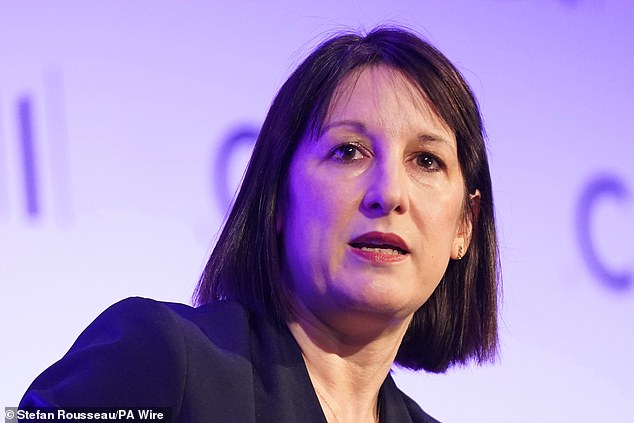Table of Contents
Unfortunately, Rachel Reeves’ pronouncements can no longer be taken at face value.
The Chancellor’s promise to the CBI that she “would not have to come back for more” taxes must be examined in Talmudic detail.
Keir Starmer and Reeves lost respect in Britain’s boardrooms when they made the decision to punish businesses and jobs with a £23.8 billion hit to be paid for by increasing National Insurance contributions ( NIC) of employers.
Now Reeves’ words to the CBI are being reinterpreted just 24 hours after he said them.
Business Secretary Jonathan Reynolds explains that there will be no more tax demands on the business community “comparable to what we had to do at the start of this parliament”. Surprise, surprise, there may be more to come.
The Labor government sidestepped the manifesto promise not to alter NICs by explaining that it only applied to workers, so raising taxes on employers was fine.
Jobs tax: Keir Starmer and Chancellor Rachel Reeves (pictured) lost respect in Britain’s boardrooms with their £23.8bn hit to be paid for by increasing employers’ contributions to NI
However, it is more than clear to most of Britain’s biggest employers – such as Tesco and Royal Mail – that workers will pay the price.
A combination of hiring freezes, job losses and higher prices means workers will be hit hard.
Higher NICs will make it much harder for the Government to complete the mission of encouraging Britain’s 9.2 million strong (including 2.8 million long-term ill) economically inactive citizens to re-enter the workforce. .
The idea that there was “no alternative” but to impose £40 billion in extra taxes on Britain, with businesses shouldering most of it, is fanciful.
Ministers may have been instructed (they still do in every interview) to repeat the smear that there was a £22bn black hole in the public finances.
However, around £9.4bn of this amount was the result of unconditional public pay deals.
Hitting employers was not the only option. One solution could have been a Musk-style government efficiency campaign.
Reeves could have backtracked on the Conservatives’ latest cut to employees’ national insurance. Fuel duties could have been increased as part of the green agenda etc.
Instead of piling funds into the NHS before reforms have taken hold, additional spending could have been done in stages.
The economy was going well until the tax increases came.
By destroying trust, production has slowed, potential tax revenues have been sacrificed, and interest on the national debt has increased.
Reeves’ CBI promise not to raise taxes was naive from someone who claims to have strong economic credentials. We live in uncertain times.
Harold Macmillan’s quote ‘Events, dear boy, events’ made in 1984, is as relevant today as ever. Public finances were diverted by the great financial crisis, the pandemic and Russia’s war against Ukraine.
There is no shortage of geopolitical shocks to contemplate, such as hostilities in the South China Sea, trade wars, new conflicts in the Middle East and the dislocation caused by climate change.
Just yesterday, Vauxhall ended more than a century of car manufacturing in Luton. There were high hopes for Reeves when he took office and a desire to see stability restored after the Conservatives’ rollercoaster ride.
It has only taken five months to dismantle the credibility so critical to growth.
bankers’ party
Liz Truss’s credibility was destroyed just days after her tax cut mini-Budget. Among the factors that cost him dearly were the decision to reduce the top income tax rate and abolish restrictions on bankers’ bonuses in a declaration.
His intention to encourage entrepreneurship was a noble cause. But Labor saw the combination of the two as a gift to the city’s wealthy people who were responsible for the great financial crisis.
Now that the Labor Party is in power, the importance of finance to Britain’s efforts to restart production has become obvious.
Taking advantage of the freedoms granted by Brexit, the Bank of England seeks to shore up London as Europe’s financial center by allowing faster access to the bonuses obtained.
The proposed new rules mean bankers will be able to receive some of their bonuses in the first year instead of having to wait three years.
The Old Lady, at least, is adopting an agenda of growth and competitiveness.
DIY INVESTMENT PLATFORMS

AJ Bell

AJ Bell
Easy investing and ready-to-use portfolios

Hargreaves Lansdown

Hargreaves Lansdown
Free Fund Trading and Investment Ideas

interactive inverter

interactive inverter
Fixed fee investing from £4.99 per month

sax

sax
Get £200 back in trading fees

Trade 212

Trade 212
Free trading and no account commission
Affiliate links: If you purchase a This is Money product you may earn a commission. These offers are chosen by our editorial team as we think they are worth highlighting. This does not affect our editorial independence.

